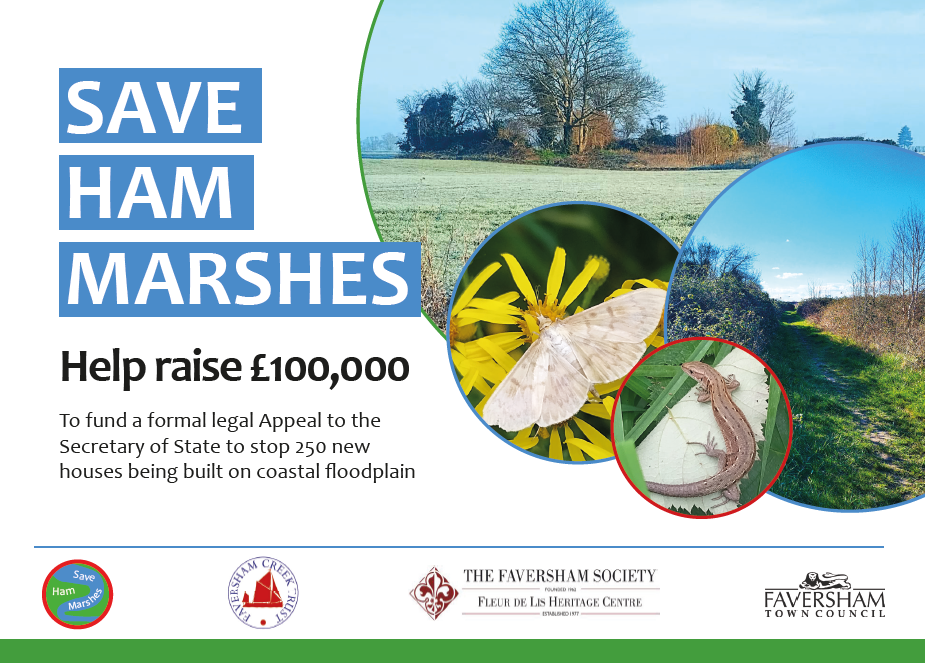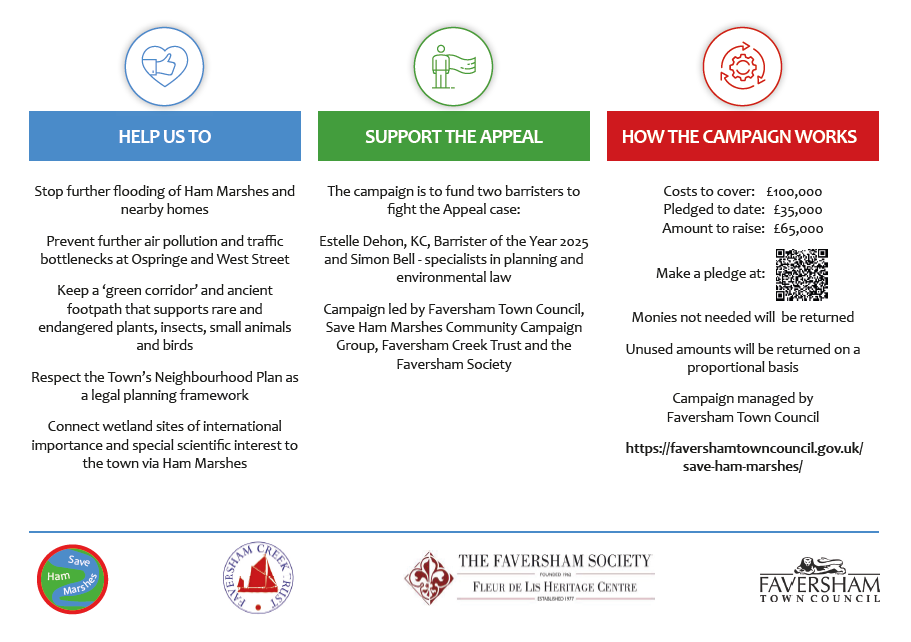Faversham Town Council has joined forces with registered charities, Faversham Society and Faversham Creek Trust, as well as a grassroots community campaigning group Save Ham Marshes, to oppose housing development on the marshes.
The only way to protect this much loved piece of land that sits adjacent to Faversham Creek, is to appeal it through the legal courts. Otherwise we are powerless to stop it.
We have appointed two experienced barristers at a cost of £100,000. The four organisations are working together to raise funds and are asking the community to pledge financial support to help continue this vital challenge – CAN YOU HELP?

MAKE YOUR PLEDGE HERE Save Ham Marshes



On 5 August Faversham Town Council lodged a s288 Planning Statutory Appeal against the Secretary of State, following the appeal decision allowing the housing development on land at Ham Road, Faversham, Kent.
The appeal followed the refusal by Swale Borough Council. The claim was served on the defendants on 6 August.
In summary, the grounds of claim allege the following errors:
- Error of law in effectively applying the Exception Test despite the Sequential Test not having been undertaken. The Inspector found, on the one hand, that a Sequential Test was required and that the Exception Test could only be carried out after the Sequential Test; while on the other hand he effectively applied the Exception Test to determine that neither the Proposed Development nor the failure to carry out a Sequential Test would cause “real world harm”;
- Irrational approach to mitigation measures in that the Inspector decided correctly that paragraph 175 of the 2024 National Planning Policy Framework (“2024 NPPF”) clearly states that “land raising”, with no qualifications as to the purpose of such land raising, should not be used as a means to avoid the Sequential Test and yet he allowed precisely that result through his approach to the lack of “real world harm” due to the proposed mitigation measures;
- Error of law in interpreting paragraph 11(d) of the 2024 NPPF where flooding risk is in issue, to require a substantive risk or harm in order for there to be a “strong reason” for refusal;
- Lack of consistency in decision making and/or failure to give clear and cogent reasons for coming to a different conclusion than seven other appeal decisions on whether failure to undertake a Sequential Test was sufficient to disapply the tilted balance.
Although the Faversham Neighbourhood Plan (FNP) is not specifically named in the appeal, the flooding grounds are defending the FNP, because that plan directs development away from areas of flood risk; so the claim is not disconnected.
The FNP is part of the statutory development plan and became a material consideration before the Inspector’s decision was made in June 2025. The relevant FNP policies are Policy FAV8: Flooding and Surface Water and FAV10: Sustainable Design and Character.
Although the Faversham Neighbourhood Plan (FNP) is not specifically named in the appeal, the flooding grounds are defending the FNP, because that plan directs development away from areas of flood risk; so the claim is not disconnected.
The FNP is part of the statutory development plan and became a material consideration before the Inspector’s decision was made in June 2025. The relevant FNP policies are Policy FAV8: Flooding and Surface Water and FAV10: Sustainable Design and Character.
The defendants had until 29 August to respond. Our barristers are now reviewing the grounds of defence and preparing a response. A judge will then consider the case papers and decide, on the basis of the documents alone, whether to grant permission for the matter to proceed to a full judicial review. This decision is expected by mid to late October. Only at that stage will we know whether our claim can move forward.
* Important points to note:
1. All funds donated will be held in a dedicated account solely for the purpose of the appeal against Gladman Developments at Ham Road.
2. If funds are not required, they will be returned to donors.
3. Once legal proceedings are complete, any unused balance will be returned to donors on a proportional basis.
4. Once we have received your pledge you will be provided with details of the bank account together with a unique reference number to quote when depositing funds.







